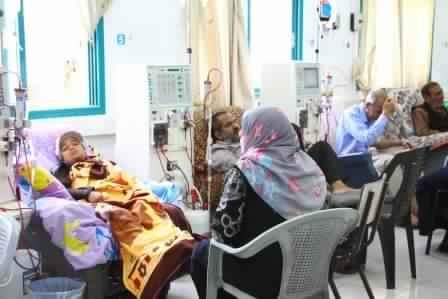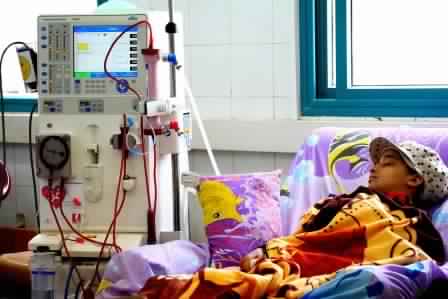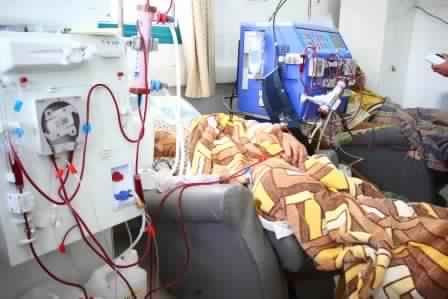Kidney patients in Gaza .. Growing suffering Lack of medicines and disruption of washing machines threaten the lives of 600 patients 😢😢😢😭
The young man Ihab El-Shagnoubi sat 23 years in front of his house in Gaza City with a number of his friends and signs of joy on his face, after God cured him of his illness. Renal disease for more than a year and a half, but his joy of healing remained deficient due to his livelihood and the suffering of hundreds of patients with kidney failure in Gaza hospitals.
"I am happy because I have been treated and my body has become normal and sad because my sick friends are still suffering from the disease that their natural lives are taking away in hospital walls," he says.
Ehab spent more years with renal failure patients and was stoked by the pain and suffering of patients waiting for dialysis, indicating that his illness resulted from taking drugs to treat colds, infections and high fever, leading to kidney failure.
During the past year, the journey of suffering began with Ehab, moving from one doctor to another until a doctor decided to have dialysis to protect his life from danger. 
He is suffering from great suffering during his treatment as he spent most of his time in Shifa Hospital, where he goes three to four days a week, and arrives at the hospital before the hour of the washing session hours to reserve his role for dialysis because of the lack of preparation of machines and the large numbers of patients.
"I felt very upset and frustrated to travel and buy a kidney and have surgery in a hospital in Jordan or Egypt, but the closure of the crossing prevented this," he said, noting that he had to wait more than seven months until the arrival of a medical delegation from Britain To conduct operations inside Gaza.
He added: "My family examined the samples of donor kidney, from which samples were taken and sent with the medical delegation to Britain because of the absence of a device to examine the compatibility of tissue within the Gaza Strip, the samples matched." 
He pointed to the return of the British medical delegation to Gaza on the twentieth of December, he conducted the operation, which culminated in success, indicating that after the operation stayed in the hospital for about a month until his condition stabilized.
"There is a big difference between my kidney failure and the process of agriculture," he said.
He called for patients to be assisted and to provide tissue analysis devices so that patients do not wait long to see the result of matching their tissues with donors and the introduction of washing machines and treatment of lack of medicines, especially injections that strengthen blood, expressing appreciation to all doctors who helped him in treatment.
Transportation exhausted them
In the room No. 1 in the Renal Failure Department at Al-Shifa Medical Complex, the patient, Lulu, was sitting in her sixties on a washing machine. Her eyes were watching the clock to see how much time she had from her blood-washing time. "I have been sick for a year and a half, My disease is the many drugs I used to take before the disease, and I do the laundry three days a week. "
The dialysis takes about two to four hours, and patients need to wash two or three days a week.
Amara pointed out that she pays 60 shikla a week instead of the wages of her transport, while she is forced to buy some medicines from her own pocket, which is between 30 to 50 shekels, indicating that the machines inside the department need maintenance and follow-up because it is broken, "Cree Moon", which resulted in the death of some patients.
Amara called for the provision of adequate and good machines for patients, and the need to provide a suitable number of nurses in this section because the patients in need of care.
Not far from Amara, the Sabbaniya sits, the freedom of Nabhan, waiting silently and worried that one of the patients ends up washing in order to be able to wash as a result of the overcrowding of the patients who need to wash, and indicates the washing process from two to three days a week, To Shifa Hospital amidst her suffering because of her transportation between transportation.
"We are forced to travel to the hospital in Gaza, which causes us to feel tired and tired, as well as the risks to our health and the financial costs that we pay for the transportation fee (40 shekels)," she said.
Nabhan agreed with the other patients on the importance of regular maintenance of washing machines so as not to hang while sitting on the patient, which expose him to the incidence of blood clotting, noting that there are drugs are available, such as "irrigation Cumin", which the price of the grain to 50 shikla, Daily.
Nabhan called for the provision of high-priced medicine for patients, especially patients with difficult physical conditions, who could not afford to buy medicine. She also called for the provision of transportation for patients, especially those living in remote areas.
Machines break down
In the next room, the patient Attia Totah sat in the fifties on the washing machine and his eyes were bursting with tears. He pointed out that he comes to wash three times a week with a private car, where the transportation fee is 60 shekels a week."I need medicine to improve my health," he said. "There is no escape from coming here." He called for the need for adequate washing devices for patients because their immune system is weak and medicines are available.
In the 30s of Al-Shuja'iya, who suffers from renal failure for seven years, due to the lack of treatment, he is forced to buy it at his own expense for NIS 100 a week.
He pointed to his need for special food and full care, indicating that the cause of his illness is the inhalation of phosphorus in the aggression of 2008 and the large number of medicines that eat and eat rotten, complaining of lack of dialysis devices and lack of spare parts, and the lack of some medicines because of the closure of the crossings and the narrow place that is Wash it.
Al-Dabbah called for the provision of appropriate equipment for patients, especially since there is a class that ends the washing process late at night, indicating the increase in the number of patients significantly.
Two brothers
Ghazi Tafesh, a resident of al-Zaytoun neighborhood, has another story. He sits on a dialysis machine next to his brother, who is treated on the other side, looking at each other and hoping that they will be treated and saved from the torment of the disease.
Tafesh said he had contracted the disease five years ago after kidney infection, explaining that the cause of the disease is a result of inheritance, and he and three of his brothers are suffering from renal failure, including a brother passed away.
Tafesh complained about long-term washing machines and said he was buying some medicines at his own expense. He called on officials to look at kidney disease with compassion because they are exceptional and it is necessary to take care of them to the fullest and provide them with assistance.
Al - Aqsa Martyrs Hospital
At Al-Aqsa Martyrs' Hospital, 20-year-old Khamis Shehadeh suffered a six-year period of dialysis, saying: "My cause of illness is the infections I suffered during my youth." He said that during his illness, Which he described as expensive.
He pointed to the fear he experienced during the days of the wars in 2014 and 2012 when he was going to the hospital with the morning hours and during the return from them and fears that he is killed by bullets and shells occupation, which does not distinguish between a patient or a resistance.
Shehadeh pointed to his need for special care and help him to provide the medicines he needs because his physical situation is very bad as he put it, explaining that his father and mother are suffering from pressure, diabetes and heart and has a blind brother, calling at the same time responsible bodies to stand with kidney patients and provide all the needs for them .
For his part, former patient Hassan Salama, a 40-year-old resident of Khan Younis who was dialysis at Nasser Medical Hospital three years ago, said that kidney patients need special care because they suffer from lack of medicines under the siege and closure of crossings, which has worsened in recent days.Kidney and kidney deficiency treatment
Children have a share in the chronic disease that deprives them of their childhood. In the renal failure section of the Rantisi Specialist Hospital for Children, there are 21 children between the ages of one and a half to 13 years old, with children facing the path of treatment.
Rantisi Hospital has 10 kidney dialysis machines for children, but the process of washing varies from one child to another in terms of number of days.
"My son does not go to school like other children because he has been suffering from renal failure for several years," she said. "I go to the hospital three days a week," she said. Indicating that she traveled on her own account.
She said she needed some medicines that were not available, and demanded that the crossing be opened in order to complete the treatment of her son abroad.
Mohammed al-Lahham, 8, from Khan Yunis, sits next to the washing machine. His mother sits on the right side and his father sits on the left side. "Muhammad comes to the hospital three times a week," he says.
He continued: "We are moving from the city of Khan Younis to Gaza City by ambulance, where there is the only specialized hospital due to the lack of a special pediatric hospital for kidney patients in the South."
"There is a big problem for sick children because there is not enough medicine in the hospital pharmacy. When we go to the pharmacy, they do not give us the required amount, but half of it," says Mohammed's father.
"My son was going to Nasser Medical Hospital in Khan Younis almost daily after a kidney transplant a few years ago, but he is still suffering from kidney transplantation," he said. Of spasms and blood problems, and because of the instability of his medical condition, he does not go to school like other children.
He pointed out that he bought the medicine at his own expense, such as nerve drugs, for which the price of 60 tablets is estimated at 400 shekels. His son needs 90 tablets per month.
Fear of increasing numbers of kidney patients
"The total number of patients with renal failure reached 600 in the Gaza Strip, including 330 patients in Al-Shifa Medical Complex, which constitutes a great burden on the hospital as a result of the siege, while 280 patients are distributed, The three hospitals are Nasser Medical, Al-Aqsa and Al-Najjar Hospitals. The dialysis is performed three times a week for four hours per session. As a result of the increase in the number of patients, there are four washing periods, Five.
He pointed out the presence of (40) washing machines and there are (17) devices need to be replaced to exceed the number of working hours and the absence of spare parts due to the circumstances we live.
"As a result of this shortage, some patients have to go home late at night. As a result of the increase in the number of patients, the working hours of the equipment are increasing, causing the equipment to be damaged and rapidly consumed," he says.
"Kidney dialysis is done for 150 patients on a daily basis on 40 devices. The kidney department at Shifa Medical Complex covers the Gaza and North regions," he said, adding that there are many reasons leading to kidney failure, such as diabetes. In addition to the diseases of pressure and high arterial pressure and some genetic diseases such as urinary tract infections and the formation of stones.
Stages of treatment
He explained that the cure of the disease goes through four stages, after treatment, which begins with diet if he is a patient with diabetes or if a patient with pressure needs to be treated to regulate pressure, in addition to the periodic follow-up kidney function, and in the case of non-adherence to the instructions we get to the fifth stage, Kidneys or renal transplantation by donating a whole person.
Al-Qishawi pointed out that there is a shortage of some medicines, the most important of which is the "rico-cartine" medicine, which raises the blood level because most patients have anemia, and these drugs contribute to the maintenance of the heart muscle and physical activity and daily work for each patient.He added: "We have demanded more than once the replacement of equipment or work to repair and access to new devices as a result of the increase in the number of patients, and we are in dire need of the establishment of a kidney in the northern Gaza Strip, pointing to the success of 17 cultivation within the Gaza Strip during the past two years, Training of medical staff from the Gaza Strip at the University of Liverpool, British, where only one operation failed.
According to a study by researcher and legal writer at Al Mezan Center for Human Rights, Dr. Alaa Matar, the most important challenges facing kidney patients are: shortage of doctors and nurses, severe shortage of kidney specialists, experienced nurses in the care of patients, Which provides kidney dialysis for children under the age of five, and the absence of dialysis, which is better than the bloody laundry available in the Gaza Strip, especially since there are many patients benefit only with this type of washing, what The Ministry of Health is required to transfer these patients for treatment abroad.
"In general, patients remain at the mercy of lack of medicines, especially the needle that works to strengthen the blood. The dialysis accessories are not suitable for children, such as blood connectors and filters, which makes the kidney process physically and psychologically burdensome.
He pointed out that the renal hospital bed in Rantisi hospital is not eligible for polarization, due to lack of number of beds and lack of ventilation and the absence of proper ventilation, and other reasons necessary for this, and says: "As for Shifa hospital, there is no bed room for patients with kidney failure, Department of Internal Medicine, which jeopardizes their lives because of their weak immunity.
End the split
He also called on the international community to shoulder its legal and moral responsibilities to ensure that the residents of the Gaza Strip enjoy their health rights and to ensure that the collective punishment imposed by the occupation forces on the Gaza Strip and its residents is stopped. To ensure public health and health conditions, to provide medical care to the population in the occupied territories, to end the division, and to ensure that service sectors are neutralized from disputes and political conflicts, so as to ensure better management of the health sector.
He called on officials in the West Bank and Gaza to improve the health services provided to patients with renal failure by doubling the number of doctors and nurses with experience in kidney diseases, providing doctors specializing in kidney diseases and raising the efficiency of doctors and nurses in kidney departments. Conferences and courses, providing sufficient numbers of dialysis devices, and providing Gambro kidney dialysis devices that allow dialysis for adults and children under 5 years of age and the provision of perotone dialysis, which is better than the bloody laundry available in the Gaza Strip.
He added that "independent departments must be built and properly equipped to accommodate patients, providing a dialysis service in the province of North Gaza, like other provinces to facilitate patients access to treatment services, and provide all medicines without exception and free of patients with renal failure.
Renal failure was the eighth leading cause of death, accounting for 3.9%
Congratulations @dhaoui! You have completed some achievement on Steemit and have been rewarded with new badge(s) :
Click on any badge to view your own Board of Honor on SteemitBoard.
For more information about SteemitBoard, click here
If you no longer want to receive notifications, reply to this comment with the word
STOP